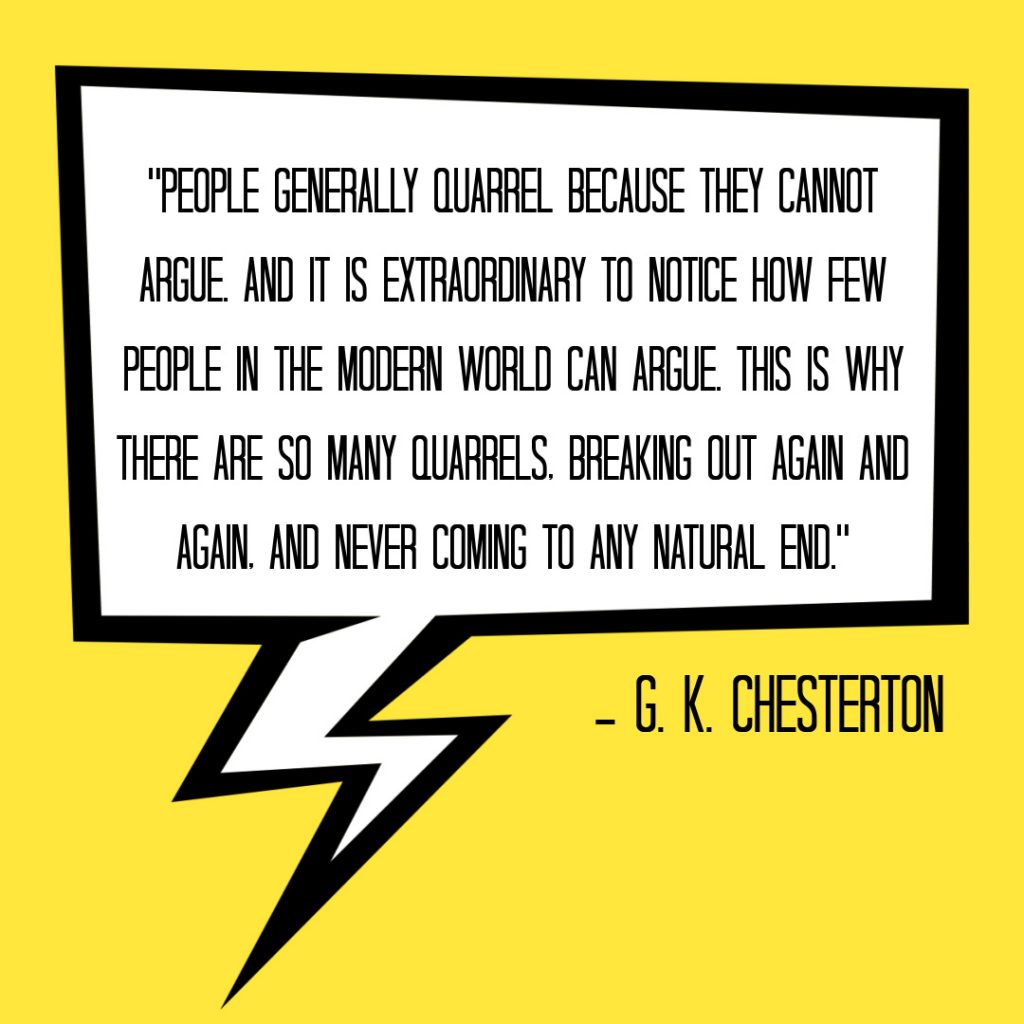We sat across from each other at the kitchen table, hands cupped around steaming mugs of tea as we debated a humanitarian “situation” taking place in my parents’ coastal town. It was the rare issue where my mom and I do not see eye to eye, and as our conversation unfolded, I continued to counter each of her points with one of my own.
Our voices might have elevated somewhat, my gestures growing more emphatic as I attempted to accurately convey my perspective, but our conversation—from my standpoint, at least—remained in the realm of rational and respectful.
Charleston, apparently, did not agree. Looking up from his bowl of Cheerios, his eyes met mine as he pleaded, “Can you PLEASE just stop fighting?!”
The thing is, we weren’t fighting. My mom and I might not have shared the same opinion on this issue, but our discussion of the topic was a polite one. We each expressed our views, backing them up with our reasoning and examples, but we did not attack one another or belittle the other’s opinion. We were not mean-spirited or hot-headed in our discussion, and while we each knew we were unlikely to change our minds on the issue, our closeness was not dependent on our coming to an agreement. We could agree to disagree on this point, moving forward in our relationship that is built on decades of mutual love and respect—including respect for differences in opinion.

I explained this to Charleston in the best way I knew how: that we were talking about something we disagreed about, but that did NOT mean we were fighting. I told him it was important for us to have these kinds of conversations with people we love, because it’s good to know what other people think (and let them, in turn, know what we think), even when—especially when—we don’t see eye to eye. I tried to help Charleston understand that differences in opinion are something to be celebrated, not feared, and that talking about them can pave the way for deeper, richer relationships with those we love.
Sadly, these are lessons that our culture at large seems to have forgotten. In the past few years we have seen countless people and organizations silenced for vocalizing opinions that don’t align with mainstream thoughts or beliefs. This cancelation and silencing has slowly trickled down from celebrities and politicians to ordinary citizens who are harassed or shunned or humiliated for possessing the “wrong” ideas and having the gall courage to express them.
One might expect that this systematic silencing of outsiders or antagonizers would result in a happier, more homogenous society, but this is not what I am seeing take place. As families, churches, friends, and communities begin holding their tongues for fear of ruffling feathers or being ostracized, the menu of “acceptable” topics has grown smaller and smaller, leaving nothing behind but the trite and inconsequential. Such shallow conversation points do not make for substantial relationship-building; as our willingness to delve into deeper waters dwindles, the quality of our relationships flounders and might even be extinguished. The connections we were attempting to preserve through our silence fall victim to the more insidious enemies of banality and well-intentioned courteousness.
When we stop talking about the BIG THINGS (politics, religion, grievances, etc.), we stop living out our full selves. And it’s nearly impossible to preserve relationships with people who are holding too much of themselves back. But the opposite is also true: when we share our full selves, uncomfortable opinions and all, we set the stage for more authentic communities where all ideas and views are welcome, and nobody fears belittlement or cancelation.
I fully believe what I expressed to Charleston that morning in my parents’ kitchen: we NEED to be talking about the things we disagree about. Not because others need to hear our opinions, but because we need to hear theirs. When we refuse to engage in these types of conversations, we become susceptible to unwise group think, unfair partisanship, and bigoted narrow-mindedness—problems that can be conquered by simply speaking up. Our conversations may not change anybody’s minds (or maybe they might), but when we enter into them with the goals of listening and learning, prioritizing curiosity and respect over our need to be right, we will almost certainly come away with changed hearts.
And now, for some personal confession: I do not do this well. I tend to rush in with my opinions, trampling everyone else in a conversation without pausing to listen or think. Or, I remain silent about the important things for so long that they fester beneath the surface, where they infect my soul and damage my capacity for grace; eventually, I cannot hold back any longer and vocalize my ideas with zero tact and even less receptivity to any perspective but my own.
This is not what I want for myself, nor is it a model I want to set for my children. I want them to see a mom who is not afraid to express her ideas, but is also not afraid of having her mind changed; who welcomes other perspectives and is able to engage in impassioned but generous conversations about things that actually matter. My desire is to be neither a wallflower NOR the loudest voice in a room.

I am skeptical that these types of conversations and relational dynamics can occur virtually. Public platforms and social media are simply not conducive to the types of not-fighting-but-clearly-disagreeing types of discussions we should be having. They need to begin within our homes, our smaller friendship circles, our neighborhoods, and our local churches. As we begin to chip away at the walls built by our silence, I believe we will come to see that we are capable of respecting, loving, and getting along with a beautiful spectrum of individuals. We will learn that we can “agree to disagree” without needing to agree to simply keep our mouths shut.